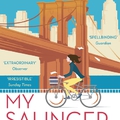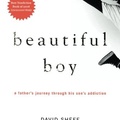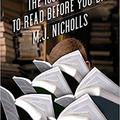Tao Lin: Richard Yates
 Tao Lin is compared to the following authors on the back cover and in the review quotes filling up the first few pages of the book: Samuel Beckett, Franz Kafka, Albert Camus, Bret Easton Ellis – and I may have omitted some names from this list. If a writer is compared to authors like these, he should be one the greatest literary geniuses of the century.
Tao Lin is compared to the following authors on the back cover and in the review quotes filling up the first few pages of the book: Samuel Beckett, Franz Kafka, Albert Camus, Bret Easton Ellis – and I may have omitted some names from this list. If a writer is compared to authors like these, he should be one the greatest literary geniuses of the century.
But just because a novel features absurd elements, it doesn’t make its author a new Beckett or Camus; just because a story is set in a frightening, uncanny and undecipherable (real/virtual) world which fills a person’s heart with fear and sadness, the author doesn’t automatically become Kafka; and just because a writer is minimalist, he doesn’t automatically become Bret Easton Ellis. (By the way, Bret Easton Ellis’s minimalism is beautiful, mellow poetry compared to that of Tao Lin. And I don’t mean this as a compliment to Tao Lin.)
And just because Tao Lin is compared to the authors mentioned above, he doesn’t suddenly become the genius of the century. Sure, he may become one one day, he is young enough for that, but I hope he won’t ever be considered a genius. And I hope the kind of writing he does won’t become „the future of literature” – as it is also claimed in one of the review quotes.
By the way, the novel tells the story of two young people: Haley Joel Osment (not the actor but a young writer) and Dakota Fanning (not the actress but a highschool student with a lot of physical and mental ailments). These two characters meet online and strike up a correspondence. First they chat on Gmail, then they meet each other a couple of times, then they fall in love with each other – of course I use the word „love” to describe their emotional state for want of a better word. Most of their time is taken up with chatting about their upcoming meeting (they don’t live in the same town, and Dakota is still a minor, so it’s not that easy to organize their meet-ups), then chatting or text messaging about how their meeting turned out. Later on Haley Joel Osment moves to Dakota Fanning’s town, but this is not so important, since their relationship doesn’t lead to anywhere.
It’s not too difficult to guess what Tao Lin „wants to say”: that this is an awful era; that people are empty; that the virtual world is a terrible place (and the real one is terrible too, for that matter); that life is pointless and absurd; that everything is meaningless; and that the meta-relationships – relationships consisting mainly of people talking about the fact that they are now in a relationship with each other – people engage in are ridiculous.
And the way Tao Lin writes is well-suited to his themes: he writes in an intentionally blunt way (which frustrates the hell out of me); he limits himself to writing about the most everyday banalities of life but he writes about these things in such a precise way which borders on the absurd. Tao Lin never says that someone is sad or worried. Oh no. He says that, for instance, „Dakota Fanning looked at Haley Joel Osment with a worried facial expression”. You might not notice the absurdity of this for the first time, but when you come across the phrase „facial expression” for the forty-seventh time, you are bound to find it ridiculous and surreal. Tao Lin writes in a style which is absurd, exaggerated and empty at the same time, and he’s also very ironic and un-literary. I find this a boring and empty style on the whole – of course it fits the themes admirably but it certainly doesn’t make for good reading.
By the way, Tao Lin describes modern (?) relationships and the constant doubts and fears a person in such a relationship fights with quite well. The real-life meet-ups of Dakota Fanning and Haley Joel Osment and their intimate moments are particularly good in this respect. At one point, for instance, Dakota and Haley lie side by side on the girl’s bed and Dakota touches Haley who doesn’t react. Some time later the boy embraces the girl but she doesn’t react. In the meantime, the boy keeps thinking that it’s Dakota’s turn next but that if he took the initiative again and didn’t wait for the girl to move, things could turn out well and they might even have a good time together. At another point Haley Joel Osment thinks that he does more things for Dakota Fanning (e.g. he paints a picture of some lemons for her), and later on he feels authorized to emotionally abuse the girl because she doesn’t do so many things for him (e. g. she doesn’t paint a picture of lemons for him).
And the last fifty or so pages are simply great: Lin depicts the power games going on in a relationship with fascinating clarity, and he captures the way the initial balance in a relationship changes in a way that one party can continuously hurt the other, yet, it is still always the hurt person who has to apologize for everything. (I guess that one reason why I find the last quarter of the book so good can be that by the time I reached that part of the novel I had gotten used to the frustratingly monotonous style of the author.)
So, Richard Yates contains several interesting and very good parts. And I wouldn’t say that this novel is yet another pointless exercise in literary tricks. But I sure as hell hated reading it.





